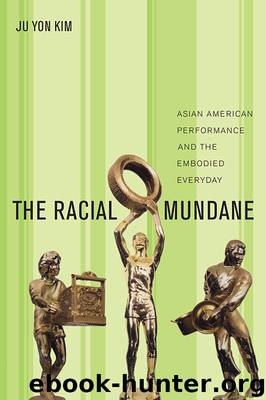The Racial Mundane by Ju Yon Kim

Author:Ju Yon Kim [Kim, Ju Yon]
Language: eng
Format: epub
Tags: LIT004030 Literary Criticism / American / Asian American
Publisher: NYU Press
Willie Mak: Practice. Be nice. Make change.
Grocer Mak: [Gruffly.] Your change.
Soomi Mak: Put the change in her hand. Look her in eyeballs . . .
Grocer Mak: Please, thank you. Come again! [All applaud, including Black Chorus. Grocer Mak grumbles.] Only children and Chinese say, “Please, thank you.” Now buy something, or get out of my store. If you can’t help us, then leave, please, thank you. (443)
Willie and Soomi suggest that altering the way in which Grocer Mak makes change can actually “make change” in a broader sense by reshaping relationships between merchants and residents. The repetition of “change” and scripting of applause after Mak rehearses polite greetings mark his unenthusiastic effort as a significant accomplishment. Mak’s grouchy remarks immediately after the applause, however, attenuate the celebratory response and point to the limitations of such behavioral training. Disparaging the manners he agrees to adopt, Mak emphasizes the disparity between his understanding of such conduct and the perception of his customers. For Mak, “cultural difference” becomes a justification for leaving both of their assumptions and expectations unquestioned, and his willingness to change his comportment reflects only a desire to maintain his business.
However, Grocer Mak’s training in politesse is not the only model of trying on unfamiliar behaviors—and thus taking advantage of the mundane’s ambiguous relationship to the body—presented in the play. For Suzie, the central question to pursue in her investigation is what exactly happened in the store between Matilda Duvet and Grocer Mak. When she asks those involved to recount the incident, each Chorus presents her with a reenactment while decrying the other side’s version as false with the exclamation, “That’s not what happened at all” (415). The characters only ever act out what happened the day of the altercation, and what routinely happens in the store, as imaginative simulations. By having the Black and Korean Choruses perform both themselves and the “other” in these reenactments, the play situates their bodies emphatically within their respective retellings of the story—a sharp contrast to Suzie and Mark’s distanced reporting and editing. The performance therefore emphasizes the mediatedness of every attempt to represent these interactions, and never offers a definitive portrayal of what occurred. Yet these reenactments also seem to ask, if the respective choruses embodied the habitus of those with whom they are in conflict—if their performances were informed by the pressures shaping the behaviors of those they play—could they begin to “make change” in a substantive way?
Initially, each Chorus’s dramatization makes its biases evident through the sympathetic contextualization of their respective members’ behaviors. As the Black Chorus prepares for their reenactment, Reverend Carter tells Barber Brown, “You are Matilda Duvet. You are going home after a long day sweeping and cleaning for some uptown peoples” (413). As Matilda, Brown laments that her sister’s husband in Haiti has disappeared, a likely victim of the repressive regime’s secret police (the ton ton macoute or bogeymen). Carter and Brown thus help explain Matilda’s mood and conduct by underlining her difficult work and concern for family members in Haiti.
Download
This site does not store any files on its server. We only index and link to content provided by other sites. Please contact the content providers to delete copyright contents if any and email us, we'll remove relevant links or contents immediately.
| General | Discrimination & Racism |
Nudge - Improving Decisions about Health, Wealth, and Happiness by Thaler Sunstein(7706)
The Fire Next Time by James Baldwin(5442)
iGen by Jean M. Twenge(5414)
Adulting by Kelly Williams Brown(4574)
The Sports Rules Book by Human Kinetics(4385)
The Hacking of the American Mind by Robert H. Lustig(4381)
The Ethical Slut by Janet W. Hardy(4251)
Captivate by Vanessa Van Edwards(3839)
Mummy Knew by Lisa James(3691)
In a Sunburned Country by Bill Bryson(3542)
The Worm at the Core by Sheldon Solomon(3486)
Ants Among Elephants by Sujatha Gidla(3467)
The 48 laws of power by Robert Greene & Joost Elffers(3291)
Suicide: A Study in Sociology by Emile Durkheim(3022)
The Slow Fix: Solve Problems, Work Smarter, and Live Better In a World Addicted to Speed by Carl Honore(3009)
The Tipping Point by Malcolm Gladwell(2920)
Humans of New York by Brandon Stanton(2873)
Get What's Yours for Medicare: Maximize Your Coverage, Minimize Your Costs by Philip Moeller(2727)
Handbook of Forensic Sociology and Psychology by Stephen J. Morewitz & Mark L. Goldstein(2704)
